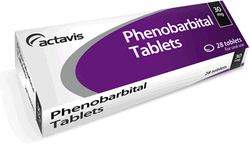Pharmacology definition - Barbiturates

Barbiturates
Barbiturates is generally useful in providing sedative effect in treating insomnia and anxiety. There are few forms of barbiturates with specific functions such as pentobarbital, thiopental (useful in induction of anesthesia) and phenobarbital ( useful in treating and managing seizures as well as neonatal hyperbilirubinemia).
Barbiturates should be avoided / contraindicated in patient with liver disease, alcoholic, patient who takes CNS depressant, patient who take benzodiazepines, patient with porphyria and pregnant women.
Barbiturates works by interfering with the transport of electrolytes across the cell membrane of the neuron which inhibit the activation of the neuron. Barbiturates may also hyperpolarized the membrane of the neuron by potentiating the GABA A receptor activity which lead to increasing flow of chloride through chloride channel.
Barbiturates may induce cytochrome p450 which lead to decrease in the level of digitalis and phenytoin in the blood.
Overdose of barbiturates may lead to respiratory depression and collapse of the circulatory system. The treatment of barbiturates overdose may include alkalinization of the urine, hemodialysis and mechanical ventilation.
The side effects of barbiturates may include teratogenic effect, nausea and sedation. Patient may also became dependent to barbiturates and suffers from withdrawal symptoms such as tremor, anxiety, seizures and nausea.
Barbiturates is generally useful in providing sedative effect in treating insomnia and anxiety. There are few forms of barbiturates with specific functions such as pentobarbital, thiopental (useful in induction of anesthesia) and phenobarbital ( useful in treating and managing seizures as well as neonatal hyperbilirubinemia).
Barbiturates should be avoided / contraindicated in patient with liver disease, alcoholic, patient who takes CNS depressant, patient who take benzodiazepines, patient with porphyria and pregnant women.
Barbiturates works by interfering with the transport of electrolytes across the cell membrane of the neuron which inhibit the activation of the neuron. Barbiturates may also hyperpolarized the membrane of the neuron by potentiating the GABA A receptor activity which lead to increasing flow of chloride through chloride channel.
Barbiturates may induce cytochrome p450 which lead to decrease in the level of digitalis and phenytoin in the blood.
Overdose of barbiturates may lead to respiratory depression and collapse of the circulatory system. The treatment of barbiturates overdose may include alkalinization of the urine, hemodialysis and mechanical ventilation.
The side effects of barbiturates may include teratogenic effect, nausea and sedation. Patient may also became dependent to barbiturates and suffers from withdrawal symptoms such as tremor, anxiety, seizures and nausea.
